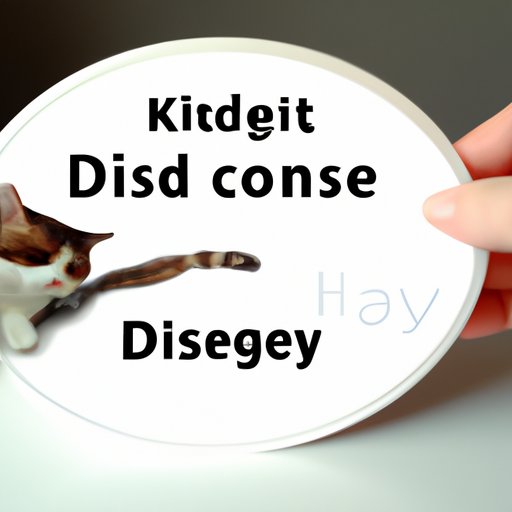
Introduction
Kidney disease is a relatively common condition in cats, particularly in older cats. The kidneys are responsible for filtering waste and excess fluids from the body. When the kidneys are not functioning properly, waste products can build up in the blood, leading to a host of health problems. One of the effects of kidney disease is weight loss, which can be detrimental to the cat’s overall health.
It is important to maintain a healthy weight in cats with kidney disease. A healthy weight can help increase energy levels, improve the immune system, and reduce the risk of other associated health problems.
The purpose of this article is to provide tips and suggestions for helping cats with kidney disease gain weight in a safe and healthy way. Topics covered will include diet modification, increased meal frequency, appetite-stimulating medication, home-cooked meals, and the importance of regular veterinary check-ups.
Diet Modification
A high-calorie cat food can be a valuable tool in helping a cat with kidney disease gain weight. Look for foods that are specifically formulated for cats with kidney disease, as they will have the appropriate balance of nutrients and minerals to support kidney function.
In addition to high-calorie cat food, consider adding supplements like probiotics, omega-3 fatty acids, and digestive enzymes to your cat’s diet. These supplements can help improve digestion and nutrient absorption, which can be particularly beneficial to cats with kidney disease.
It is important to maintain a balanced diet, however. While it may be tempting to offer your cat a variety of treats or human food, keep in mind that these can be high in calories and low in nutrients. Instead, focus on providing a balanced diet that supports your cat’s overall health.
Increased Meal Frequency
Offering smaller, more frequent meals can be an effective way to stimulate appetite in cats with kidney disease. Rather than offering just two meals a day, try offering three or four smaller meals throughout the day. This can help encourage your cat to eat more and maintain a healthy weight.
When deciding on an appropriate feeding schedule, keep in mind your cat’s individual needs and preferences. Some cats may prefer to eat around the clock, while others may prefer to snack periodically throughout the day.
It is important to monitor portion sizes, however. Overfeeding can lead to weight gain, which can be just as detrimental to your cat’s health as weight loss. Work with your veterinarian to determine an appropriate feeding schedule and portion sizes to ensure your cat maintains a healthy weight.
Appetite-stimulating Medication
Appetite-stimulating medication can be another tool in helping a cat with kidney disease gain weight. These medications work by increasing your cat’s appetite, making them more likely to eat. However, there are some cautions to keep in mind when using appetite-stimulating medication.
First, these medications should only be used under the guidance of a veterinarian. Second, these medications can have side effects, so it is important to monitor your cat closely while they are taking them. Finally, these medications may not be appropriate for cats in later stages of kidney disease, as they may be too ill to receive the full benefit of the medication.
Home-cooked Meals
While commercial cat foods can be a valuable tool in helping cats gain weight, some pet owners may prefer to feed their cats home-cooked meals. This can be a more time-consuming and expensive option, but it can also be very rewarding.
To create a balanced home-cooked meal, it is important to work with a veterinarian to ensure your cat is receiving all the necessary nutrients. Avoid feeding your cat foods that are toxic to cats, such as onions and garlic. Be sure to cook meat thoroughly to avoid the risk of bacterial infections.
Regular Check-ups
Finally, it is important to maintain regular check-ups with your veterinarian. Regular check-ups can help monitor your cat’s weight and overall health, and can also help identify any potential health problems before they become more serious.
During check-ups, your veterinarian may recommend adjustments to your cat’s treatment plan. This can include changes to diet, medication, or feeding schedules.
Conclusion
Gaining weight can be a challenge for cats with kidney disease, but it is an important aspect of maintaining their overall health and well-being. By making some simple modifications to their diet and feeding schedule, offering appetite-stimulating medication, or providing home-cooked meals, you can help your cat gain weight in a safe and healthy way.
Remember to work closely with your veterinarian to determine the best course of action for your individual cat. With a little time and effort, you can help your feline friend achieve a healthy weight and a happy, healthy life.




